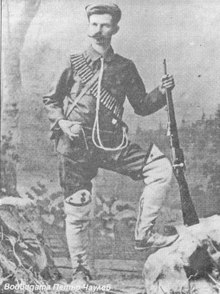| VoivodePetar Chaulev | |
|---|---|
| Петър Чаулев | |
 Petar Chaulev in uniform. Petar Chaulev in uniform. | |
| Born | c. 1882 Ohrid, Manastir Vilayet, Ottoman Empire (now Republic of North Macedonia) |
| Died | 23 December 1924 (aged 41–42) Milan, Kingdom of Italy |
| Cause of death | Assassination |
| Nationality | Ottoman/Bulgarian |
| Military career | |
| Allegiance | |
| Service | |
| Battles / wars | |
Petar Chaulev (Bulgarian: Петър Чаулев; Albanian: Petar Çaulev; 1882 – December 23, 1924) was a Bulgarian revolutionary in Ottoman Macedonia. He was a local leader of the Internal Macedonian Revolutionary Organization (IMRO).
Biography
He was born into an Orthodox Albanian family in Ohrid. His father was a Tosk Albanian fisherman from southern Albania. Chaulev was fluent in Albanian, and spent several years living in Albania where he got the nickname 'Petrush'. Cultural closeness was expressed by such Orthodox Albanians from the mixed Albanian-Bulgarian area in western Macedonia and some gradually became Bulgarianized. He graduated from the Ohrid Bulgarian Class School and then from the Bulgarian High School in Bitola, moving in revolutionary circles. He participated in the Ilinden-Preobrazhenie Uprising and later became a Bulgarian teacher and secretary within the local revolutionary organization. After the Young Turks Revolution in 1908 he associated with the left wing of IMRO - People's Federative Party (Bulgarian Section).
During the Balkan Wars Chaulev supported the Bulgarian Army. After the Second Balkan War he led the Ohrid-Debar Uprising in 1913 against the Serbs. During the First World War he served as a sergeant in the 11th Macedonian Infantry Division of the Bulgarian army and later was appointed as governor of Ohrid. After the First World War Chaulev rejoined in Sofia to the re-established there IMRO. Petar Chaulev together with Aleksandar Protogerov and Todor Aleksandrov formed the new Central Committee of the IMRO. Since 1922, as the head of the Bitola Revolutionary District and in charge of maintaining contacts with the Albanian and Italian authorities, Chaulev often resided in Albania and in Italy.
In 1924 IMRO forged connections with the Comintern. As result Chaulev signed the so-called "May Manifesto" in Vienna along with Alexandar Protogerov concerning the formation of a Balkan Communist Federation and cooperation with the Soviet Union. They did this after being authorized from the absent IMRO leader Todor Alexandrov, signing the document from his name too. The revelation that the patriotic IMRO officially sanctioned such a separatist document with the communists caused uproar in its ranks. Aleksandrov and Protogerov promptly denied that they have ever signed any agreements, claiming that the May Manifesto was a communist forgery. Shortly after, Alexandrov was assassinated by unclear circumstances. Chaulev who sticked to the Manifesto and was suspected as involved in Aleksandrov's murder, was assassinated in Milan in December 1924.
Chaulev was also a writer, publishing the book Skipia (Albania) in 1924 in Istanbul.
References
- With new leadership embodied in General Alexander Protogerov, Todor Alexandrov and Petar Chaulev, IMRO decided, despite the Bulgarian defeat, to continue the struggle for the unification of Macedonia and Bulgaria. For more see: Dmitar Tasić (2020) Paramilitarism in the Balkans. Yugoslavia, Bulgaria, and Albania, 1917-1924. OUP Oxford, ISBN 9780191899218, p. 29.
- Николов, Борис Й. ВМОРО: Псевдоними и шифри 1893-1934. София, Издателство „Звезди“, 1999. ISBN 954951417X. с. 41, 51, 62, 97, 98, 108.
- "Българи сме, ще ни интересува как се управлява тая страна, но нашия интерес трябва да има граници. Три години скитам по чужди страни, много по-хубави, много по-културни и много по-свободни, но България обичам повече от всички, защото съм българин." Македонский вопрос в документах Коминтерна. Часть I: 1923-1925, Часть II: 1923-1925. Сост. Ленина Жила, Владо Поповски, Скопиjе, 1999, с. 627-634. «Открытое письмо Петра Чаулева Кириллу Пырличеву» 13 Октября, 1924 г.
- Освободителнитѣ борби на Македония, том II, Хр.Силянов, стр. 404-405.
- Георгиев, Величко, Стайко Трифонов, История на българите 1878 - 1944 в документи, том 1 1878 - 1912, част втора, стр. 475-481. „Българските революционни чети в Македония според доклад на А. Тошев до министъра на външните работи и изповеданията Д. Станчов“.
- Илюстрация Илинден, бр. 132, стр.11.
- SKENDER, ASANI (2014). "PETAR ÇAULEV DHE VEPRA E TIJ "SHQIPËRIA"". Studime Albanologjike. ITSH: 25-28.
- Dimitar Bechev, Historical Dictionary of North Macedonia, Historical Dictionaries of Europe, Rowman & Littlefield, 2019, ISBN 1538119625, p. 67.
- Bernd J. Fischer, Oliver Jens Schmitt (2022) A Concise History of Albania. Cambridge University Press; ISBN 9781107662186, p. 115.
- Македония. Етнография и статистика. В. Кѫнчовъ (I изд. Бълг. Книжовно Д-во, София, 1900; II фототипно изд. "Проф. М. Дринов", София, 1996) стр. 86.
- Rothschild, Joseph (1959). The Communist Party of Bulgaria; Origins and Development, 1883-1936. Columbia University Press. p. 171.
- Марков, Георги. Покушения, насилие и политика в България 1878 – 1947. София, Военно издателство, 2003. ISBN 954-509-239-4. с. 204 – 207.
- SKENDER, ASANI (2014). "PETAR ÇAULEV DHE VEPRA E TIJ "SHQIPËRIA"". Studime Albanologjike. ITSH: 25-28.
This Bulgarian biographical article is a stub. You can help Misplaced Pages by expanding it. |
This Macedonian biographical article is a stub. You can help Misplaced Pages by expanding it. |
- 1882 births
- 1924 deaths
- People from Ohrid
- People from Manastir vilayet
- Bulgarian people of Albanian descent
- Members of the Internal Macedonian Revolutionary Organization
- Bulgarian revolutionaries
- Bulgarian educators
- Bulgarian military personnel of the Balkan Wars
- Bulgarian military personnel of World War I
- Assassinated Bulgarian people
- Bulgarian people murdered abroad
- People murdered in Italy
- Deaths by firearm in Italy
- 20th-century Albanian military personnel
- Rebels from the Ottoman Empire
- Albanian people from the Ottoman Empire
- People assassinated in the 20th century
- Bulgarian people stubs
- Macedonian people stubs